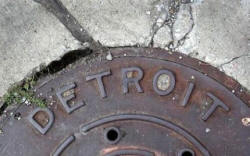|
 Detroit
workers, retirees vote in favor of city's debt plan Detroit
workers, retirees vote in favor of city's debt plan
 Send a link to a friend
Send a link to a friend
[July 22, 2014]
By Karen Pierog and Lisa Lambert
(Reuters) - Detroit's city workers and
retirees overwhelmingly agreed to accept the city's debt adjustment
plan, according to results filed late Monday, potentially clearing the
way for the struggling city to exit bankruptcy in the next few months.
|
|
 Documents filed in U.S. Bankruptcy Court show the city's current
and retired police and fire employees, along with other active and
retired city workers, will accept pension reductions to help adjust
$18 billion in debt in the largest-ever U.S. municipal bankruptcy
case. Most bondholders rejected the plan, along with insurers
backing some of the debt. Documents filed in U.S. Bankruptcy Court show the city's current
and retired police and fire employees, along with other active and
retired city workers, will accept pension reductions to help adjust
$18 billion in debt in the largest-ever U.S. municipal bankruptcy
case. Most bondholders rejected the plan, along with insurers
backing some of the debt.
The city declared that the "overwhelming" vote by members of its two
retirement systems to accept changes to their pensions puts it on
track for a coming trial to determine whether the plan is fair and
feasible. That phase is scheduled to begin on Aug. 14, overseen by
Judge Steven Rhodes.
"The voting shows strong support for the city's plan to adjust its
debts and for the investment necessary to provide essential services
and put Detroit on secure financial footing,” said Detroit Emergency
Manager Kevyn Orr in a statement.

Detroit filed for bankruptcy in July 2013 after decades of dwindling
population and a declining manufacturing base left the city of
approximately 688,000 unable to pay its bills.
About 82 percent of the Police & Fire Retirement System and 73
percent of the General Retirement System retirees and active
employees voted in favor of the plan, which calls for pension
reductions, the statement added.
Under the so-called grand bargain, Detroit will tap $466 million
pledged by philanthropic foundations and the Detroit Institute of
Arts and $195 million from the state of Michigan to ease pension
cuts and save art work from being sold to pay city creditors.
A rejection of the plan would have dissolved the grand bargain,
leaving retirees with bigger pension cuts.
Four classes of Detroit creditors, including limited-tax general
obligation bonds and pension debt, voted to reject the plan, while
six accepted it, the court filings showed.
Voting results for $5.27 billion of water and sewer revenue bonds
were unclear. Two of the three bond insurers whose votes were to be
counted in lieu of bondholders, voted against the plan, according to
court documents.
[to top of second column] |

Parties to the city's first creditor settlement - Bank of America
unit Merrill Lynch Capital Services and UBS AG - also accepted the
plan, which would give them $85 million to terminate costly
interest-rate swap deals. But 100 percent of the creditors for $1.47
billion of defaulted pension debt associated with the swaps rejected
the plan, which offers them a recovery of just pennies on the
dollar.
Syncora Guarantee Inc and Financial Guaranty Insurance Co, which
guarantee payment of the pension debt, are two of the last remaining
major creditors battling the city in court.
Syncora late on Friday asked the court to delay the confirmation
hearing until Sept. 29, citing a lack of full documentation of
settlements Detroit has entered into with some creditors. The bond
insurance company said its ability to prepare for the hearing is
"significantly prejudiced" without the documents. Lawyers for the
city objected to the delay, saying it was unnecessary and
potentially costly. Syncora is one of the city's few remaining
hold-out creditors.
Nearly 96 percent of holders of unsecured limited-tax GO bonds
turned down the plan, while 87 percent of unsecured unlimited-tax GO
bond creditors voted for it.
A July 18 report by Martha Kopacz, a senior managing director at
Phoenix Management Services in Boston, who was chosen by Rhodes in
April as an expert witness, concluded that the plan was feasible and
that its revenue, expense and payment assumptions were reasonable.
(Reporting By Karen Pierog and Lisa Lambert, Editing by David Gaffen
and Jacqueline Wong)
[© 2014 Thomson Reuters. All rights
reserved.] Copyright 2014 Reuters. All rights reserved. This material may not be published,
broadcast, rewritten or redistributed.
 |